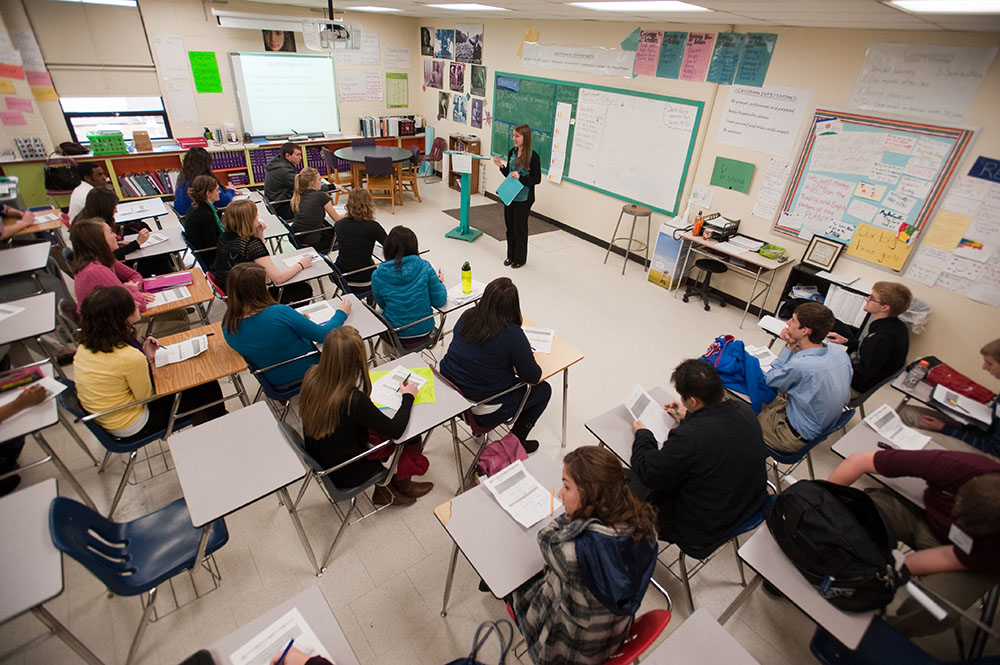Hesston College’s results from the 2012 Community College Survey of Student Engagement (CCSSE) are among the highest in the country and reinforce the college’s claim that Hesston is a great place for students to start their college career.
The survey measures student perceptions of their engagement in their academic work in five key benchmark areas that research shows contribute to learning: active and collaborative learning, student effort, academic challenge, student-faculty interaction and support for learners.
Results from the same survey conducted in 2009 earned the college a number two national ranking from “Washington Monthly” magazine among other two-year colleges in terms of student engagement and overall success in 2010. At that time, Hesston ranked at the 97th and 98th percentile in four of the five benchmark areas.
In keeping with recent trends, Hesston’s results are on the top end of the scale.
The results from the 2012 survey surpass even the 2009 data, giving college leaders, faculty, staff and students alike much to celebrate.
All five of the benchmark areas for 2012 were above the top 10 percent of all 2012 CCSSE participants. In student-faculty interaction and support for learners, Hesston scored at the highest score reported by all 266 participating colleges.
“Our CCSSE results show us that we are finding success in the efforts we make to be caring and people-centered while providing our students with excellent academics,” said Dr. Sandra Zerger, vice president of Academics.
The college began using CCSSE in 2007 to help identify areas for improvement. At that time, the college scored only slightly higher than the national average in four of the five benchmark areas. Administrators and faculty decided to use the survey results to improve the learning experience for students, and the newest data reflects great success in those efforts.
“It is exciting to see the improvement we have made since our earliest experience with the survey,” said Zerger. “The survey results help us build a faculty team based on the factors of success.”
The steps toward improvement have been calculated and intentional at both a collective and individual level. The Dean’s office and faculty members collaboratively discuss the survey data, how it affects them and their courses and how to respond. Faculty also attend on-campus in-service workshops and off-campus conferences geared specifically toward those areas needing improvement.
“Our faculty care about improving the academic experience for students,” said Nelson Kilmer, chair of the science and math division and who analyzes and interprets Hesston’s survey results. “We always want to know how we can improve. We care deeply about our students’ learning.”
Hesston faculty explore their strengths and weaknesses even further by using the Individualized Developmental Education Assessment (IDEA) survey for at least one of their courses each year. The national survey measures student perceptions of the quality of individual courses and instruction.
When Hesston began using the IDEA survey in 2006, 11 percent of all courses were in the top quartile nationally when compared to both two- and four-year colleges. With the most recent survey conducted for the 2011-12 year, 76 percent of all Hesston courses scored above the national average, as compared to 50 percent for all IDEA colleges surveyed, and 38 percent of all Hesston courses scored in the top quartile.
The IDEA Institutional Report states that “A summary score of 60 percent or more of the classes above the IDEA average is considered exceptional.”
Students attest to the exceptional quality of their courses, instructors and overall educational Hesston Experience.
“All of my classes are small, so my instructors know me personally, know how I am doing in their class and are quick to offer help when they know I need it,” said Ezekiel Lazaro of Andover, Kan., a sophomore studying Aviation and Air Traffic Control.
“I have been to other colleges and have never felt such genuine interest from faculty and staff for my academic pursuits and personal life as I do at Hesston,” said Jennifer Kaberline of McPherson, Kan., a non-traditional first-year student in Hesston’s two-year RN nursing program. “My instructors use a lot of interactive projects and small-group discussions in class. I appreciate being able to hear different perspectives on topics from other students.”
Although college leaders don’t know if the college’s CCSSE results will be used for rankings again, the evidence of student satisfaction and learning is enough of a success in itself.
And until the next survey rolls around in three years, the college will continue to make Hesston College an exceptional place to start.


